Oil Firms Spill 3,346 Barrels Of Crude Oil In Eight Months ― Investigation — Economic Confidential

Oil Firms Spill 3,346 Barrels Of Crude Oil In Eight Months ― Investigation
Oil and gas companies operating in Niger Delta spilled 3,346.94 barrels of crude oil, an equivalent of 532,078 litres, in eight months, from January to August 2020, according to data obtained from the National Oil Spill Detection Response Agency, NOSDRA.
The agency established by the National Assembly of the Federal Republic of Nigeria Act of 2006 as an institutional framework to co-ordinate the implementation of the National Oil Spill Contingency Plan (NOSCP) for Nigeria, regularly embarks on Joint Investigation Visits and ensures the remediation of impacted sites.
Breakdown
A breakdown showed that the volume of oil spilled in the first eight months of 2020, represented a decline of 82.84 per cent, compared to 19,505.07 barrels of crude oil spilled in the same period in 2019. The value of crude oil spilled in the first eight months of 2019 stood at $780,202, an equivalent of N288.675 million.
For 2019, the series of data from NOSDRA revealed that 28,969.86 barrels of crude oil were spilled by oil and gas companies, valued in monetary terms, at $1.159 million, an equivalent of N428.754 million.
Companies Involved
On a company by company basis, the report revealed that Shell Petroleum Development Company, SPDC, recorded the highest spills, with 1,335.05 barrels of crude oil spilled in 17 incidents; followed by ND Western, with 1,280 barrels of crude oil spilled in five incidents.
Others on the list include Chevron Nigeria Limited, one barrel of crude oil spilled in three incidents; Enageed Resources Limited spilled 15 barrels of crude oil in three incidents; First Hydrocarbon Nigeria spilled 62 barrels of crude oil in six incidents; while Guaranteed Petroleum Limited spilled eight barrels in one incident.
In addition, Heritage Energy Operational Service Limited spilled 264 barrels in five incidents; Midwestern Oil and Gas Corporation spilled 37 barrels of crude oil in three incidents; Nigerian Agip Oil Company, 185.17 barrels in 12 incidents and Nigerian Petroleum Development Company, NPDC, two barrels of crude oil spilled in one incident.
The rest are Neconde Energy Limited, 12.58 barrels in one spill; Pan Ocean Corporation Nigeria Limited, 20 barrels of crude oil spilled in one incident; Seplat Petroleum Development Company Limited spilled 85.14 barrels of crude oil six incidents; and Total Upstream Nigeria, 40.01 barrels in two incidents.
Giving a breakdown of oil spill by volume, the report stated that in January, February, March, April and May 2020, 777.73 barrels, 51 barrels, 46.50 barrels, 586.93 barrels, and 105 barrels of crude oil were spilled respectively; while 38 barrels, 1,737.77 barrels and 4.01 barrels were spilled in June, July and August 2020 respectively.
In comparison, 5,325.32 barrels, 4,075.84 barrels, 1,290.16 barrels, 1,273.89 barrels, 1,133.63 barrels, 2,240.95 barrels, 1,997.72 barrels and 2,167.56 barrels of crude oil were spilled in January, February, March, April, May, June, July and August 2019 respectively.
Cleanup, Remediation Cost
In an interview with Energy Vanguard, Prof. Hilary Inyang, an internationally renowned Environmental Scientist, Explorer and Educator, who has led many environmental expeditions globally, said: “It would cost between $1 million and $30 million to clean up one spill incident, depending on some factors, including location and size of contaminated site.
“It is expected that clean up would cost more in the Niger Delta because most of the spills take place in the swamp not on land. It is not about going to the various locations to clean surface oil. It would cost much money to get to the contaminated sites, engage with communities, do fencing, investigation, hire or procure equipment, technology, recruit and train personnel, carry out the exercise as well as do demobilisation and remediation.”
Specifically, with 66 spill incidents involved in the first eight months of 2020, it was gathered that it would cost at least $66 million to cleanup the spills, which translates to N25 trillion at the current Exchange rate of N380 per dollar.
Investigation
Nevertheless, investigation by Energy Vanguard indicated that the outbreak of Coronavirus pandemic has slowed down the pace of cleanup and related activities.
In its latest Oil Spill Data, obtained by Energy Vanguard, which attributed many of the incidents to vandalism and oil theft, stated:
“In order to ensure that the individuals involved in the remediation of oil spills are not put at risk of COVID-19 infection, SPDC, after due consultation with relevant Government regulators is currently restricting its oil spill response activities to only those sites where containment and recovery of oil from new releases is required.
“At sites where containment and recovery has been achieved, but remediation of residual oil impact has not yet been completed, activities have been suspended for the safety of workers and community members. This approach will be reviewed on a regular basis and in consideration of advice from Nigerian and international health officials.”
Experts
Explaining the damage of oil spills to the Nigerian economy and the environment, Programme Coordinator of the Nigeria Natural Resource Charter, NNRC, Ms. Tengi George-Ikoli, disclosed that the Niger Delta is currently suffering from poor response to oil spill and lack of capacity of government’s agencies to tackle environmental issues.
She warned that unless issues of environment protection are taken seriously, the Niger Delta might suffer immense negative consequences and abandonment when global attention shifts away from fossil fuel.
George-Ikoli lamented that oil exploitation had always presented a huge negative impact on the ecosystem of the Niger Delta region, giving rise to intense land degradation, rapid agricultural decline, fisheries depletion, rampant and destructive oil spillages, continuous gas flaring and toxic water contamination among others.
This, she added, had negatively affected the health, environment and livelihoods of the Niger Delta people.
George-Ikoli, also lamented that NOSDRA, the agency set up to address some of the grave consequences of oil exploitation, who is also mandated to respond to oil spills, was currently hampered by an almost debilitating lack of capacity.
She further stated that there is currently poor response to oil spills because of NOSDRA’s lack of capacity, adding, however, that the capacity gaps in NOSDRA were not due to a lack of expertise but instead lack of funding and punitive powers.
Also speaking, Dr Sam Kabari, a Lecturer in Environmental Management and Pollution Control, Nigeria Maritime University, Okerenkoko, Delta State, stated that the country needed a NOSDRA which functions as an environmental regulator in the issuance of guidelines and standards and able to address all manner of spills, noting that at the moment, NOSDRA can only detect oil spills but cannot respond.






